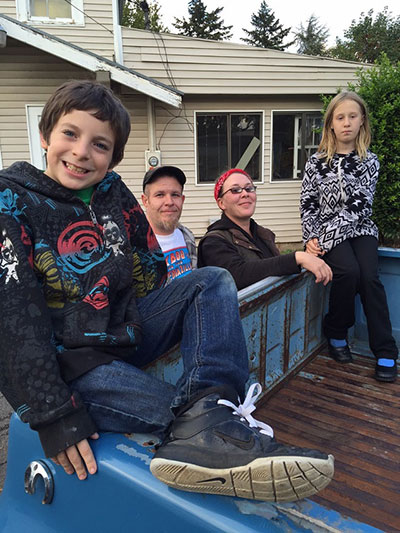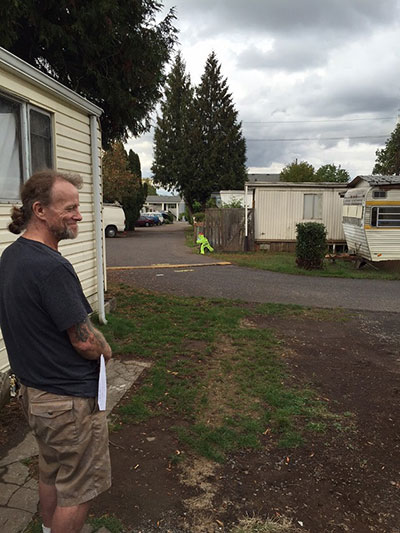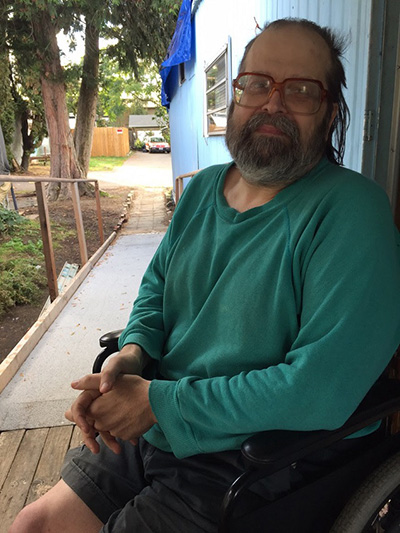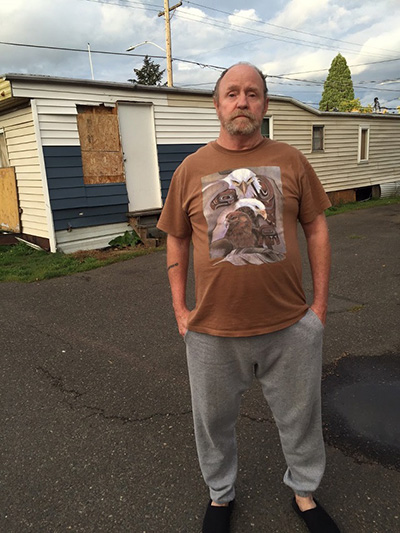Did you know that Truthout is a nonprofit and independently funded by readers like you? If you value what we do, please support our work with a donation.
Just a minute inside Victor Johanson’s single-wide trailer at the Oak Leaf Mobile Home Park on NE Killingsworth in Portland, Oregon, and three things became clear.
First, mold spores in the air were at a level so high as to be unhealthy to breathe, and possibly dangerous. Water was actively dripping through his tarp-covered roof into plastic bins on his living room couch.
Second, Johanson, 57, who is disabled and uses a wheelchair, is doing his best to maintain his dignity in the face of overwhelming odds. He said he couldn’t smell the mold himself due to his vulnerable medical condition.
“My sense of smell is gone, with the diabetes,” Johanson said. “It’s tough for me. I’m trying to hang in there.”
 Victor Johanson, 57, inside his Oak Leaf mobile home. (Photo: Thacher Schmid)Third, any real solution for the Oak Leaf Mobile Home Park will have to address conditions inside the park’s aging 1960s and 1970s trailers. Some, like Johanson’s, may currently be unsafe for human habitation. Like a handful of others, Johanson owns his trailer, but many at the Oak Leaf rent. Built in 1954, the park has been the source of 14 nuisance and housing complaints to the city since 2007, online city records show. Current owner Van Tran of Pleasanton, California, the target of 11 of those, purchased the park in 2009.
Victor Johanson, 57, inside his Oak Leaf mobile home. (Photo: Thacher Schmid)Third, any real solution for the Oak Leaf Mobile Home Park will have to address conditions inside the park’s aging 1960s and 1970s trailers. Some, like Johanson’s, may currently be unsafe for human habitation. Like a handful of others, Johanson owns his trailer, but many at the Oak Leaf rent. Built in 1954, the park has been the source of 14 nuisance and housing complaints to the city since 2007, online city records show. Current owner Van Tran of Pleasanton, California, the target of 11 of those, purchased the park in 2009.
At a city council hearing on June 16, Portland City Commissioner Dan Saltzman, in charge of theHousing Bureau, promised Julie Massa of CASA of Oregon, a Sherwood-based nonprofit that has helped other mobile home communities around Oregon to form self-owned cooperatives, and a group of cheering supporters asking for an Oak Leaf self-owned cooperative, “One way or another, we’ll get it done.”
Now, Oak Leaf residents say Saltzman’s gone back on his word, and Portland Housing Bureau Assistant Housing Director Javier Mena, a participant in the Oak Leaf process, said CASA of Oregon has “pulled out of the deal.” At a planned meeting October 19 at St. Charles Borromeo, Mena said he may unveil details of a new strategy to help Oak Leaf residents stay, but it’s not clear what that will look like. Oak Leaf residents insist self-determination is their salvation, but may soon have to downgrade expectations in order to avoid homelessness.
 While the sign in front of the Oak Leaf reads “No Vacancy,” residents report there are numerous mobile homes in the park currently unoccupied, but some are boarded up andmay not be habitable. (Photo: Thacher Schmid)“The political people have to understand, what’s important here is doing the right thing,” said Johanson.
While the sign in front of the Oak Leaf reads “No Vacancy,” residents report there are numerous mobile homes in the park currently unoccupied, but some are boarded up andmay not be habitable. (Photo: Thacher Schmid)“The political people have to understand, what’s important here is doing the right thing,” said Johanson.
“We at the housing bureau have not really dealt with mobile home parks at all,” Mena said. “This is our first opportunity to address the issue; we’re learning a lot.”
Even in fast-gentrifying Portland, there are still mobile home parks left. “This is the tip of theiceberg,” Mena said. “What I’ve been trying to do is use this as a pilot to see what is our strategy regarding mobile home parks. There is no way we would be able to save all of them if all would turn right now, there’s too many of them.”
In order to understand the saga of the Oak Leaf and how it reflects the difference between political posturing and the complicated realities of affordable housing, it’s helpful to look at what happened when a group of Oak Leaf supporters went before Portland’s City Council on June 16.
Seated in front of a group of children holding “Save the Oak Leaf” signs, Massa sounded optimistic describing the Oak Leaf community’s chances of successfully forming a self-owned co-op. “I see a tremendous cadre of leadership skills, courage, within the existing group of Oak Leaf residents,” she said.
 Oak Leaf resident and co-op board Vice President Stevi Rae, third from left. (Photo: Thacher Schmid)“I’m here to ask you to grant their request for $1.5 million, so that they can put their vision intoaction,” Massa said. “Like the other manufactured home communities have done, additionally, I request that the funds come from a source that contains the maximum amount of flexibility, and theleast amount of restrictions.”
Oak Leaf resident and co-op board Vice President Stevi Rae, third from left. (Photo: Thacher Schmid)“I’m here to ask you to grant their request for $1.5 million, so that they can put their vision intoaction,” Massa said. “Like the other manufactured home communities have done, additionally, I request that the funds come from a source that contains the maximum amount of flexibility, and theleast amount of restrictions.”
Prodded by Commissioner Amanda Fritz, Saltzman said, “The owner has agreed to entertain an offer from the residents, and CASA is playing a key role in that…. We would not spend any of theconstruction excise tax until there’s been an approved plan by council, except for the Oak LeafMobile Home Park. That’s one I would recommend we would move ahead on as soon as we can.”
Commissioner Nick Fish then asked Saltzman, “Do we have to have the construction excise tax, or could we use the funds in the [Homeownership Incentive Program]?”
“We could probably do that too, but one way or another, we’ll get it done,” Saltzman responded. Cheers and clapping were heard from Oak Leaf supporters, many of whom were children.
“One way or another, we’ll get it done.” said Saltzman
“We Oak Leaf residents are not giving up,” Oak Leaf resident Tara Prince then said. Another resident, Rhonda Polk, added, “We want the opportunity to show the community that we’re not that negative, we have a beautiful image of what we want to share with the community, and so we just want to say thank you again for your support in helping us with this.”
Mayor Charlie Hales then laid it on thick. “You have as a group done an amazing job of organizing,” Hales said. “No one can fail to be impressed by what you’ve done. I’m certainly impressed. We appreciate you as Portlanders, thank you very much.”
“Well, good work,” Hales then said, appearing to end the discussion of a done deal on a positive note. He then added, apparently without irony, “I bet we haven’t seen the last of this group.”
 Hugh Elliott, co-op member, outside his Oak Leaf mobile home. (Photo: Thacher Schmid)Indeed, they hadn’t, since the Oak Leaf folks came back to city hall in September to protest, accusing Saltzman of “breaking his promise to help low-income families save their homes and create Portland’s first resident-owned affordable housing cooperative,” as a video by Kalimah Abioto on Facebook page “Save the Oak Leaf” puts it.
Hugh Elliott, co-op member, outside his Oak Leaf mobile home. (Photo: Thacher Schmid)Indeed, they hadn’t, since the Oak Leaf folks came back to city hall in September to protest, accusing Saltzman of “breaking his promise to help low-income families save their homes and create Portland’s first resident-owned affordable housing cooperative,” as a video by Kalimah Abioto on Facebook page “Save the Oak Leaf” puts it.
In a September 27 email to Oak Leaf cooperative president Joe McLeod, Saltzman repackaged his commitment, not mentioning CASA of Oregon, or the cooperative model:
Since my first meeting with Oak Leaf residents in May, I have been committed to helping theresidents remain and to improve the infrastructure and living conditions at the Park. The Portland Housing Bureau will provide a total of $1.5M towards the purchase and rehabilitation of the park. Please work through Javier Mena, the Assistant Director of the Portland Housing Bureau, about thedetails and requirements of the funding.
CASA of Oregon Executive Director Peter Hainley and another staff person did not respond to phone calls seeking comment.
Pastoral Associate Gabe Triplette of St. Charles Borromeo and Anti-Displacement Coordinator Cameron Herrington of Living Cully have been key organizers in the Oak Leaf residents’ fight to save their homes, residents say. The first Save the Oak Leaf Facebook page post features volunteers from Living Cully’s Cully Housing Action Team building a wheelchair ramp for Johanson.
 Victor Johanson and his new wheelchair ramp. (Photo: Thacher Schmid)“These are the real people, who are very helpful,” Johanson said of the volunteers from Living Cully, CASA of Oregon and Habitat for Humanity, who he said built his wheelchair ramp and were helping him get his roof fixed. Commissioner Saltzman, on the other, Johanson said, is “playing politics. You say one thing, do another.”
Victor Johanson and his new wheelchair ramp. (Photo: Thacher Schmid)“These are the real people, who are very helpful,” Johanson said of the volunteers from Living Cully, CASA of Oregon and Habitat for Humanity, who he said built his wheelchair ramp and were helping him get his roof fixed. Commissioner Saltzman, on the other, Johanson said, is “playing politics. You say one thing, do another.”
Saltzman’s chief of staff Brendan Finn says the commissioner is standing behind his promise of $1.5 million for Oak Leaf residents, but doesn’t care whether it’s a co-op or rental model. “Dan’s intentions are to make sure the folks of the Oak Leaf don’t get evicted and don’t end up homeless,” said Finn. “I think he’s kind of agnostic as far as what route we go to get there.”
On September 30, Cameron Herrington of Living Cully recalled a meeting in which the housingbureau’s staff started pushing for the nonprofit model.
“The Portland Housing Bureau came to a meeting of the resident co-op and told the board that they were not going to provide funds, and instead, they wanted to find a third party nonprofit to buy thepark and run it as a rental property,” Herrington said.
“The housing bureau had a lot of different reasons that they cited for why they wanted to fund a nonprofit rather than the co-op,” Herrington said. “As far as I’m concerned, none of those reasons held up under even a little bit of scrutiny.”
One possible reason behind the apparent shifting of gears toward a rental model is that the conditions inside the trailers were not known.
Was Saltzman’s office aware of conditions inside the community?
“We’ve been aware that the conditions are not good at Oak Leaf, but we haven’t gone in and taken an inventory of conditions that I know of,” Finn said.
“No one’s ever been in my trailer,” Johanson told me when I stepped inside on October 2. Johanson said his roof has leaked ever since he bought it in 2004.
“City inspectors went and made the statement — that all the trailers were going to have to be destroyed and new ones put in,” Johanson said. “They need to come in and look at every trailer.”
What would it cost to replace all the units at Oak Leaf? “That’s where the price tag went up from $1.5 to $4 or $5 million,” Mena responded. Mena says he’s working on a new program strategy that would both address code violations and “incent the property owner to not displace the residents that are there.”
For his part, Johanson says the difference between self-determination and the rental model is “extremely personal.” It’s not clear how much more rent he and other residents might pay if another owner, private or nonprofit, took over, unless the new owner calculated rent as a percentage ofincome, as seen in public housing and Section 8. Johanson pays $460 a month in housing costs, he said, of his $821 Social Security income per month — plus his Pacific Power bill, $117 a month year-round.
Co-op board members say they can manage the park.
“Self-determination is what the sticky point is for us,” says another board member, Larry O’Mara. “They want a 501(c)(3) to manage it. I have no doubt we can manage it.”
“The main thing is understanding what the purpose of [the co-op] is. $460 is reasonable for me,” Johanson says. “It’s over $1,000 to get something brand new. We’re trying to come up with an answer so we can stay here…. I have no [other] place to go.”
The Housing Bureau now appears to be looking at management by a nonprofit organization.
Mena says there are nonprofits that could help manage Oak Leaf, but he won’t say who the city is working with in the wake of CASA’s departure. St. Vincent De Paul is one of a very few nonprofits that do this kind of work.
Oak Leaf residents say they have friends living at Camp Amanda, a homeless encampment that sprang up in the wake of city sweeps of the Springwater Corridor, which a July article I co-wrote for Willamette Week suggested was then the largest in the nation. They’re keenly aware how precarious their situation remains, Oak Leaf co-op Vice President Stevi Rae said.
“We’re hoping that we don’t get to join them [at Camp Amanda],” she said.
Asked about the condition of the trailers at the park, Rae said “I’m not able to talk about that.”
Asked about conditions, O’Mara said that owner Van Tram and previous owners haven’t put any money into maintenance, and that some trailers have been home to squatters, abandoned or shuttered.
 Oak Leaf co-op board member Larry O’Mara in front of a boarded-up trailer next to his. O’Mara has been living at the park for 29 years, he said. (Photo: Thacher Schmid)“Van Tran just quit everything, other than having the maintenance guy,” O’Mara said.
Oak Leaf co-op board member Larry O’Mara in front of a boarded-up trailer next to his. O’Mara has been living at the park for 29 years, he said. (Photo: Thacher Schmid)“Van Tran just quit everything, other than having the maintenance guy,” O’Mara said.
O’Mara says owner Van Tran, CASA and Housing Bureau staff shut co-op board members out of theloop, hiding key information.
“When CASA took over, the flow of information stopped,” O’Mara said. “Stuff that Van Tran was required to release was released to CASA. So [the co-op is] flying blind here, we have no idea what the [park’s] operating cost is, and what would be required to meet the operating cost. CASA has that, and Javier [Mena] has that, but they keep it close to their vest.”
O’Mara’s also convinced there are cheaper ways to upgrade Oak Leaf mobile homes than what thecity plans to do.
“There are places that sell mobile homes for $3,000 to $5,000, reclaimed,” O’Mara said, naming a vendor called Oasis.
But there are other problems as well. “The city was talking $145,000 for removal, replacement, fixing the sewers,” O’Mara said. “There’s no drainage.”
While the Portland Tribune’s story notes that the Oak Leaf’s manager let the park deteriorate, themost notable absence in coverage of the Oak Leaf situation by KOIN and OPB is any discussion ofowner Van Tram’s responsibilities, or the neglected conditions of the Oak Leaf community.
Another question: Did city or state authorities neglect their duty to inspect or enforce code violations?
Mena says city inspectors are overburdened, and warns that increased scrutiny by city officials bringsthe risk of harming mobile home park residents by spurring owners like Tram to sell faster, or raise rents.
“Once we tell the owner that they need to address whatever the issue is, they’re going to displace theresident,” Mena said. “They’re going to increase the rent, typically.”
Oak Leaf residents refer to Tran’s on-site manager, Helen Fisher, as “family,” but unlike residents, Fisher declined to talk about the Oak Leaf’s pending sale. Perhaps the two signs on her front door say it all. “I’ll try to be nicer if you try to be smarter,” the first one reads. The second is, “I believe that no problem is so large that it can’t be pushed off on someone else.”
Whatever happens next with Oak Leaf — whether St. Vincent de Paul or another takes over the park, or there’s some miraculous change of heart that allows the co-op to buy and self-manage it — it’s clear that the idea of city officials using public funds to save mobile home parks is no day in thepark.
Traditionally, affordable housing has been the province of government; mobile home parks, on theother hand, remained firmly in the private sector.
“This is low-income housing,” Johanson says. “We’re supposed to be able to get help.”
Indeed, especially in Portland’s current housing crisis, mobile home parks serve as de factoaffordable housing, and are much cheaper than typical apartment rentals of similar size.
Yet Portland’s dozen or so mobile home communities — including others right down the road from Oak Leaf — aren’t public housing, Section 8, project-based Section 8, or affordable housing, built with tax breaks and subject to regular inspections and other forms of government regulation.
What constitutes acceptable risk for the mobile park owners who may not mind risking city fines andmay not sweat a little bad publicity, is simply not true of nonprofit ownership. Nonprofits like CASA of Oregon and St. Vincent de Paul depend on grants and government funding, and can’t afford bad publicity. Their focus tends to be showing the world how awesome they are at helping poor people.
There’s also the related question of dollars. If officials are ponying up $1.5 million for Oak Leaf, but another $3 million is needed to fix it up, and nonprofits shy away from managing a community without working sewers or habitable units, then what’s next for Oak Leaf?
Members of the co-op board strongly support self-determination, but when pressed, admit a nonprofit model is superior to homelessness.
“If it’s the last resort to keep these people housed, I would do anything,” O’Mara said. “If this goes away, they’d have nothing, nowhere. They picked up cans and bottles to get a place over their head.”
They also say they’ll fight as long as they can for cooperative ownership.
“I have hope and faith,” says Hugh Elliott, another Oak Leaf resident, who asks of Saltzman andother city officials: “Help us get it right.”
Press freedom is under attack
As Trump cracks down on political speech, independent media is increasingly necessary.
Truthout produces reporting you won’t see in the mainstream: journalism from the frontlines of global conflict, interviews with grassroots movement leaders, high-quality legal analysis and more.
Our work is possible thanks to reader support. Help Truthout catalyze change and social justice — make a tax-deductible monthly or one-time donation today.
